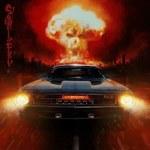
Sturgill Simpson SOUND & FURY
(Elektra)
When you think of Sturgill Simpson, you tend to think of the outlaws of country like Merle Haggard or Waylon Jennings. You may think of when he boycotted the CMAs, playing his acoustic guitar and busking outside of the arena. I think of his rambunctious and electric SNL performance where his band tore up the stage and destroyed their instruments. So, in a twisted way, Simpson’s new record, SOUND & FURY, makes sense. Ever since his 2014 breakthrough Metamodern Sounds in Country Music, we should have seen some sort of hard left turn coming, one that would defy expectations and cement Sturgill as one of the most fascinating artists working. It’s an added bonus that the record is great, a beautifully tense record from a disillusioned alt-country star.
SOUND & FURY is a record born from rage. Musically and thematically, Simpson’s fourth record sounds and feels angry—from the fractured nation he lives in to the phoniness of the music industry he has to deal with. In terms of production and instrumentation, the album represents this angst perfectly. It has more in common with the blues-rock of ZZ Top than outlaw country, with grimy clavinets and textured percussion lining the walls of each song. Piercing analog synths blare through Remember to Breathe, where a laid back groove rumbles with confidence. Ronin, which focuses on looping and hazy guitar work, introduces the album perfectly by laying all the cards on the table. That chaos and anger is exemplified best on A Good Look, which was co-written by John Prine. Sturgill pulls together an odd collision of instruments here, from the soaring guitars of the intro to the rattling drums and warbling electric pianos of the verse—all of which add to a giant, head-scratching tune. The production is consistently turned into a complete wall of sound, with guitars, keys, and bass turning into a swirl of mayhem. As much as that’s intentional, it doesn’t always stick the landing, with Simpson’s powerhouse of a voice getting the short end of the stick in the mix.
The tightest tunes here tend to be the mid-tempo ones, or the ones with the cleanest production. The aforementioned Remember to Breathe has a solid pace that makes it one of the most listenable songs, while Sing Along is by far the catchiest, even with that clipping guitar tone. I keep finding myself coming back to the two calmest songs here. Mercury in Retrograde leans hard towards 80s synthpop, almost calling to mind the huge synths of A Flock of Seagulls’ Space Age Love Song. While Sturgill lashes out against music publicists and journalists in the lyrics, there’s a calm psychedelia to the choruses. The most surprising moment here is Make Art Not Friends, where Simpson seems genuinely exhausted. The song starts with rising action: a cascading synth, tense drum grooves, and light guitar licks, but it breaks down into the slowest track on the record. By the time Sturgill starts singing about “bloodshot eyes and a heart of stone,” you can hear the anger melting into weariness, leaving us with the most cutting moment on the record. It’s a moment of honesty on an album built around outlaw machismo, a moment that lets you in just enough so you can stay connected.
